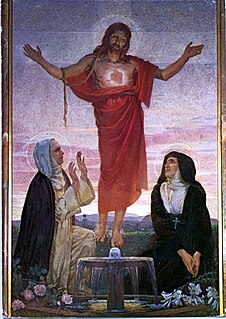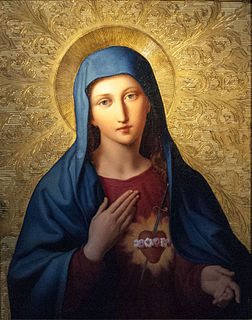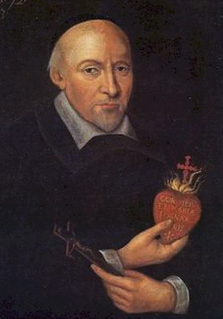External links
- Apostleship of Prayer | U.S. Website
- Youth and Young Adult Ministry of the Apostleship of Prayer in the U.S.
- Apostleship of Prayer | International Website
- Apostleship of Prayer Collection at the University of Dayton Archives
The Pope's Worldwide Prayer Network, previously known as the Apostleship of Prayer, is a worldwide association of Catholics and other Christians who strive to make their ordinary, everyday lives apostolically effective. Through the Apostleship of Prayer, the Pope gives his monthly prayer intentions to the entire Church. For this reason, the Apostleship came to be known as "the Pope's own prayer group." [1]
The Apostleship of Prayer was founded December 3, 1844 by François-Xavier Gautrelet SJ (1807-1886) in the Jesuit formation house of Vals-près-le-Puy (Haute-Loire, France). Within decades, the Jesuit Superior General, Henri Ramière SJ (in office 1861-1884), defined the movement as "a league of zeal and of prayer in union with the Sacred Heart of Jesus". [2] The movement spread throughout the Catholic world. At the very beginning, Father Gautrelet emphasized that the salvation of souls was a supernatural goal and could therefore be achieved most effectively through supernatural means. Addressing his younger Jesuit brothers, he said, "Be apostles now, apostles of prayer! Offer everything you are doing each day in union with the Heart of our Lord for what he wishes: the spread of the Kingdom for the salvation of souls." [3]
Gautrelet taught the seminarians to offer each day to God. Thus, their prayer, study, work, recreation, headaches would advance the work of the missions as much as their direct work in the field. The seminarians took this idea of a Daily Offering to the surrounding villages. This soon was formalized into what is now known as the Morning, or Daily Offering.
In 1861 the first Messenger of the Sacred Heart was published in France. It is the print organ of the Apostleship, distributed regularly in dozens of foreign languages the world over. It has been listed as "forbidden reading" my several regimes throughout the twentieth century.
In 1861, Father Henri Ramière, S.J. adapted the organization for parishes and various Catholic institutions, making it more well-known through his book "The Apostleship of Prayer", which has been translated into many languages. [4] In 1879 the association received its first statutes, approved by Pope Pius IX, and in 1896 these were revised and approved by Leo XIII. [5] The statutes were most recently revised in 2018.
The Apostleship of Prayer has always operated under the auspices of the Society of Jesus. The morning offering and prayers are the basic membership requirements. In many countries, the apostleship has no registration, no groups, no fees, or special meetings. [6]
Reflecting on the Apostleship's history since 1844, Pope John Paul II wrote in 1994:
As the dawn of the third millennium approaches [...] it is obvious how urgent it is for members of the Apostleship of Prayer to be involved in the service of the new evangelization. [...] the Apostleship of Prayer [...] has performed an important service during the past hundred and fifty years by giving new life to people's awareness of how valuable their lives are to God for the building up of His Kingdom. [7]
By 2010, the Apostleship was preparing for the 70-year jubilee and launched an initiative to renew its work in the world, keeping the goal of praying according to the pope's intentions as its guiding principle. Its "very useful and popular" way of working was perceived as needing renewal, so that "its formulas, prayers, and practices should be adapted to the new generations." A four-year process, dubbed by its leaders as the re-creation of the AP came to an end in 2014. [8]
By the 1880s Pope Leo XIII could see that this simple, profound way of life was spreading so he announced prayer intentions for every month to go with the Daily Offering. They would bring members closer to each other and closer to Christ. Pope Pius XI added a specific missionary intention for each month in 1929. These intentions were prayed specifically for those men and women committed to spreading the Gospel around the world. In 2017, Pope Francis returned to the practice of announcing just one monthly intention.
On its 100th anniversary in 1944 Pope Pius XII gave thanks to God for the Apostleship of Prayer, calling it "one of the most efficacious means for the salvation of souls, since it concerns prayer and prayer in common." He commended the organization for its goal: "to pray assiduously for the needs of the Church and to try to satisfy them through daily offering." [9]
By the year 2000 the Apostleship of Prayer had over 40 million members, 50 different Messengers of the Sacred Heart, and 40 other periodicals. [10]
Adherents of the Apostleship consider that it has given singular importance to devotion to the Sacred Heart of Jesus. [11]
Apostleship in the society encoourages a spirit of self-offering throughout the week and embracing all day-to-day activity: prayer, work in the office or home, joys and recreation, problems, sicknesses, and sacrifices.
The Apostleship of Prayer says that it is a form of spirituality that helps them do this in a simple, concrete way. It gives them a motive – love for Christ, and it gives them a technique – the Daily Offering. It presents them with a practical way of living life in union with Christ and making him truly present to the world.
PopesPrayer.Va is "a pontifical work, whose mission is to pray and encounter the challenges facing humanity and the mission of the Church that concern the Holy Father, expressed in his monthly intentions."

The devotion to the Sacred Heart is one of the most widely practised and well-known Catholic devotions, wherein the heart of Jesus is viewed as a symbol of "God's boundless and passionate love for mankind". This devotion is predominantly used in the Catholic Church, followed by high-church Anglicans, Lutherans and some Western Rite Orthodox. In the Latin Church, the liturgical Solemnities of the Most Sacred Heart of Jesus is celebrated the first Friday after the Solemnity of Corpus Christi, or 19 days after Pentecost Sunday.The 12 promises of the Most Sacred Heart of Jesus are also extremely popular.
Fr. James Aloysius Cullen S.J, was an Irish Catholic priest who founded the Irish Messenger of the Sacred Heart and the Pioneer Total Abstinence Association (PTAA)

Catholic Mariology refers to Mariology – the systematic study of the person of Mary, mother of Jesus, and of her place in the Economy of Salvation – within Catholic theology. Mary is seen as having a singular dignity above the saints. The Catholic Church teaches that she was conceived without original sin, therefore receiving a higher level of veneration than all other saints. Catholic Mariology thus studies not only her life but also the veneration of her in daily life, prayer, hymns, art, music, and architecture in modern and ancient Christianity throughout the ages.

The Immaculate Heart of Mary is a devotional name used to refer to the interior life of the Blessed Virgin Mary, her joys and sorrows, her virtues and hidden perfections, and, above all, her virginal love for God the Father, her maternal love for her son Jesus Christ, and her motherly and compassionate love for all mankind. Traditionally, the Immaculate heart is depicted pierced with seven wounds or swords, in homage to the seven dolors of Mary and roses, usually red or white, wrapped around the heart.

Alexandrina Maria da Costa, best known as Blessed Alexandrina of Balazar, was a Portuguese mystic and victim soul, member of the Association of Salesian Cooperators, who was born and died in Balazar. Alexandrina left many written works, which have been studied mainly in Italy by Father Umberto Pasquale. On 25 April 2004 she was declared blessed by Pope John Paul II who stated that "her secret to holiness was love for Christ".
The Messenger of the Sacred Heart is a Roman Catholic periodical; the print organ of the Apostleship of Prayer, a pious association founded in nineteenth century France by the Jesuits. There are many editions in various languages, promoting devotion to the Sacred Heart of Jesus. In the late 1940s, The Messenger was banned in many Soviet Block countries.

John Eudes was a French Roman Catholic priest and the founder of both the Order of Our Lady of Charity in 1641 and Congregation of Jesus and Mary also known as The Eudists in 1643. He was also a professed member of the Oratory of Jesus until 1643 and the author of the proper for the Mass and Divine Office of the Sacred Hearts of Jesus Christ and the Blessed Virgin. Eudes was an ardent proponent of the Sacred Hearts and dedicated himself to its promotion and celebration; the Masses he compiled for both Sacred Hearts were both first celebrated within his lifetime. He preached missions across France, including Paris and Versailles, while earning recognition as a popular evangelist and confessor. Eudes was also a prolific writer and wrote on the Sacred Hearts despite opposition from the Jansenists.
Catholic devotions are particular customs, rituals, and practices of worship of God or honour of the saints which are in addition to the liturgy of the Catholic Church. The United States Conference of Catholic Bishops describes devotions as "expressions of love and fidelity that arise from the intersection of one's own faith, culture and the Gospel of Jesus Christ". Devotions are not considered part of liturgical worship, even if they are performed in a church or led by a priest, but rather they are paraliturgical. The Congregation for Divine Worship at the Vatican publishes a Directory on Popular Piety and the Liturgy.
Holy actions are when Roman Catholics offer their work, prayers, apostolic undertakings, daily works, hardships of life, relaxations of body and mind, and family and marriage lives to the Lord, in union with the Holy Sacrifice of the Mass, in the Spirit of Love.

In Roman Catholicism, the morning offering is a prayer said by an individual at the start of the day in order to consecrate oneself to Jesus Christ. The practice has traditionally been associated with the Apostleship of Prayer. While since 1929 the Pope has added a general and a mission intention to the traditional morning offering prayer each month, Pope Francis has restored this to the original, single monthly intention. Over time other forms of the morning offering prayer have been suggested.

The Chaplet of Saint Michael the Archangel, also called the Rosary of the Angels is a chaplet resulting from a reported private revelation by the Archangel Michael to the Portuguese Carmelite nun Antónia de Astónaco. It was approved by Pope Pius IX in 1851.

Ingruentium malorum is an encyclical of Pope Pius XII on reciting the rosary, issued on September 15, 1951, the Feast of the Seven Sorrows of the Virgin Mary. "It is an appeal for an intensification of the traditional October Rosary devotions, making a particular recommendation for the family recitation of the Rosary, begging Our Lady to obtain peace for individuals, for families, for peoples, for nations, and for the Church throughout the world."

Throughout history Roman Catholic Mariology has been influenced by a number of saints who have attested to the central role of Mary in God's plan of salvation. The analysis of Early Church Fathers continues to be reflected in modern encyclicals. Irenaeus vigorously defended the title of "Theotokos" or Mother of God. The views of Anthony of Padua, Robert Bellarmine and others supported the doctrine of the Immaculate Conception of the Virgin Mary, which was declared a dogma in 1850.

The Mariology of the popes is the theological study of the influence that the popes have had on the development, formulation and transformation of the Roman Catholic Church’s doctrines and devotions relating to the Blessed Virgin Mary.

Catholic Marian movements and societies have developed from the veneration of the Blessed Virgin Mary by members of the Catholic Church. These societies form part of the fabric of Mariology in the Catholic Church. Popular membership in Marian organizations grew significantly in the 20th century, as apparitions such as Our Lady of Fátima gave rise to societies with millions of members, and today many Marian societies exist around the world. This article reviews the major Marian movements and organizations.

The Roman Catholic tradition includes a number of devotions to Jesus Christ. Like all Catholic devotions, these prayer forms are not part of the official public liturgy of the Church but are based on the popular spiritual practices of Roman Catholics. Many are officially approved by the Holy See as suitable for spiritual growth but not necessary for salvation.

A number of prayers to Jesus Christ exist within the Roman Catholic tradition. These prayers have diverse origins and forms. Some were attributed to visions of saints, others were handed down by tradition.

Saint Caterina Volpicelli was an Italian Roman Catholic professed religious and the foundress of the Maids of the Sacred Heart of Jesus.

The Alliance of the Hearts of Jesus and Mary refers to the historical, theological and spiritual links in Catholic devotions to the Sacred Heart of Jesus and the Immaculate Heart of Mary.
Ignatian spirituality, also known as Jesuit spirituality, is a Catholic spirituality founded on the experiences of the sixteenth-century theologian Ignatius of Loyola, founder of the Jesuit order. The main idea of this form of spirituality comes from Ignatius's Spiritual Exercises, the aim of which is to help one "conquer oneself and to regulate one's life in such a way that no decision is made under the influence of any inordinate attachment." The Exercises are intended to give the person undertaking them a greater degree of freedom from his or her own likes and dislikes, so that their choices are based solely on what they discern God's will is for them. Even in the composition of the exercises by Ignatius early in his career, one might find the apostolic thrust of his spirituality in his contemplation on "The Call of the Earthly King" and in his final contemplation with its focus on finding God in all things.